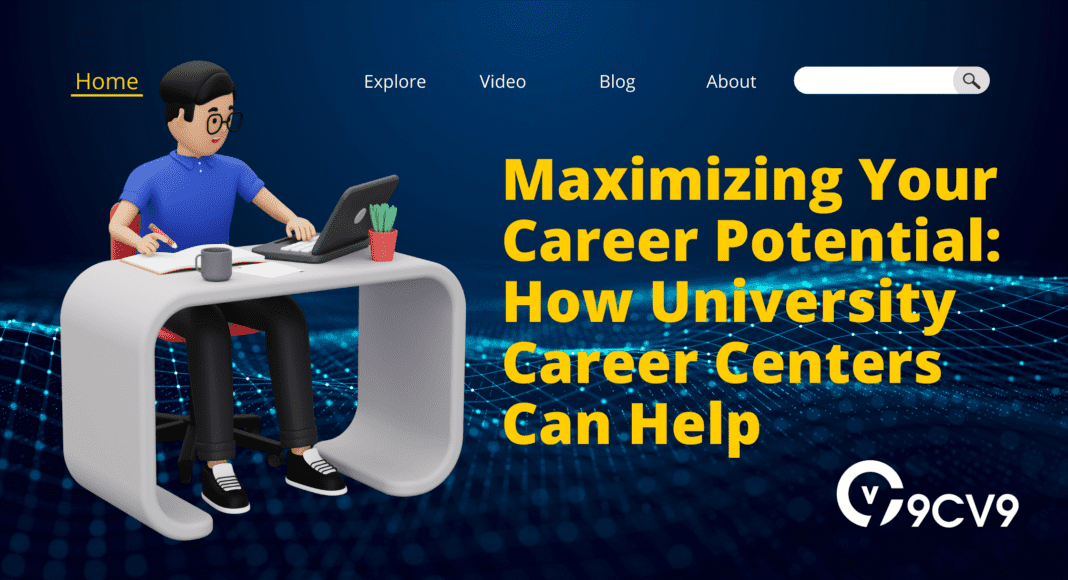Key Takeaways
- Personalized Guidance: University career centers offer one-on-one counseling and assessments to help students discover their strengths and align them with suitable career paths.
- Access to Opportunities: Career centers provide exclusive job listings, internships, and networking events, giving students a competitive edge in the job market.
- Future-Proofing Skills: Utilizing career center resources can equip students with essential skills and knowledge, ensuring long-term career success in an ever-evolving job market.
In a world driven by relentless innovation and constant change, the pursuit of a successful and fulfilling career has become an ever-evolving challenge.
Gone are the days when a single degree or a lifetime job was the ticket to professional contentment.
Today, your career path is a complex journey that requires not only academic prowess but also adaptability, networking finesse, and a keen understanding of industry trends.

If you’re a student or a recent graduate standing at the crossroads of your professional life, you’ve likely contemplated questions like, “What career should I pursue?” or “How can I land my dream job?”
These questions are not merely academic; they are the stepping stones to a future filled with opportunities and personal growth.
This is precisely where university career centers come into play, serving as the unsung heroes of your educational journey.
They are often the compass that guides you through the labyrinth of career choices, job applications, and the ever-intimidating interviews.
In this comprehensive blog post, we embark on a journey together, one that will illuminate the often-overlooked but immensely valuable role of university career centers.
We’ll explore how these centers can be your secret weapon in the quest for career success, not just during your time on campus, but for a lifetime.
Whether you’re a current student uncertain about your career path, a soon-to-be graduate entering the job market, or even an alumnus seeking to enhance your professional trajectory, the insights shared here are tailored to help you maximize your career potential.
But wait, there’s more! This blog post is not just a conventional guide; it’s a holistic resource designed to offer you much more than just an understanding of what career centers do.
We’ll delve into the practical benefits of utilizing these centers, with real-life success stories and testimonials from individuals who’ve walked the path you’re about to embark upon.
You’ll gain insights into how to make the most of your interactions with career center advisors and access a treasure trove of opportunities you might not even know exist.
We’ll discuss the skills and knowledge you can acquire to boost your career prospects and tackle common misconceptions and challenges that students often encounter.
Furthermore, we’ll peer into the future of work and explore how career centers are evolving to prepare you for the jobs of tomorrow.
In a world where the only constant is change, these centers are your anchors, ensuring you remain not only employable but also ahead of the curve.
So, fasten your seatbelts as we embark on this enlightening journey through the world of university career centers.
By the end of this blog post, you’ll be equipped with the knowledge, tools, and confidence needed to navigate your career path with purpose and precision.
Whether your dreams are grand or your ambitions modest, the insights you’ll gain here will be invaluable on your journey to success.
Are you ready to unlock your career potential? Let’s begin.
Before we venture further into this article, we like to share who we are and what we do.
About 9cv9
9cv9 is a business tech startup based in Singapore and Asia, with a strong presence all over the world.
With over six years of startup and business experience, and being highly involved in connecting with thousands of companies and startups, the 9cv9 team has listed some important learning points in this overview of the guide on how to maximize your Career Potential by using the University Career Centers.
If you are looking for a job or an internship, click over to use the 9cv9 Job Portal to find your next top job and internship now.
Maximizing Your Career Potential: How University Career Centers Can Help
- Benefits of Utilizing University Career Centers
- Maximizing Your Experience with University Career Centers
- Challenges and Misconceptions
- Future-Proofing Your Career
1. Benefits of Utilizing University Career Centers
One-on-One Advising Sessions
- Benefit: University career centers offer personalized, one-on-one advising sessions with experienced career counselors.
Assessment Tests for Career Fit
- Benefit: Career centers provide access to career assessment tests that can help you identify your strengths, interests, and potential career paths.
- Data: A survey found that individuals who use their strengths daily are 8% more productive and six times more likely to be engaged in their work.

Access to Job and Internship Opportunities
Internship Databases and Job Boards
- Benefit: Most university career centers maintain databases of internship opportunities and job boards that are exclusively available to students.
Campus Recruitment Events
- Benefit: Career centers often organize on-campus recruitment events, including job fairs, where students can meet prospective employers and submit their resumes.
Resume and Interview Preparation
Resume Review and Critique
- Benefit: Career centers offer professional resume review and critique services to help you create a compelling resume that stands out to employers.
- Data: According to a survey by TheLadders, recruiters spend an average of 7.4 seconds reviewing a resume. An effective resume can significantly impact your chances of getting noticed.

Mock Interview Sessions
- Benefit: Many career centers conduct mock interview sessions to help you practice and refine your interview skills.
- Data: A survey found that the interview process can take an average of 23 days, making it crucial to excel in interviews to secure job offers promptly.

Skill-Building Workshops and Resources
Workshops on Networking, LinkedIn, and Professional Etiquette
- Benefit: Career centers offer workshops on essential skills such as networking, creating a LinkedIn profile, and professional etiquette.
- Data: According to a LinkedIn survey, over 80% of professionals believe that networking is crucial for career success.
Online Resources and Tools for Skill Development
- Benefit: Career centers often provide access to online resources and tools that can aid in skill development.
- Example: The University of California, Berkeley, offers free access to LinkedIn Learning, with thousands of courses on a wide range of skills.
- Data: LinkedIn Learning reported that its users who complete a course are 30% more likely to get a job or career opportunity.
2. Maximizing Your Experience with University Career Centers
University career centers are valuable resources, but how you engage with them can significantly impact your career journey.
To ensure you get the most out of your experience, consider the following strategies:
Setting Clear Career Goals
- Benefit: Before seeking career center assistance, define your career goals and objectives.
Regularly Visiting the Career Center
- Benefit: Don’t wait until you’re about to graduate to visit the career center; start early.
Actively Participating in Workshops and Events
- Benefit: Attend workshops and events offered by the career center to enhance your skills and knowledge.
Building a Strong Network Through Career Center Resources
Networking is a critical aspect of career development, and university career centers can help you build and leverage valuable connections.
Attending Networking Events
- Benefit: Career centers often host networking events that provide opportunities to connect with professionals and alumni.
Utilizing Alumni Connections
- Benefit: Leverage the career center’s alumni networks to gain insights and advice from those who have successfully navigated the job market.
Staying Updated with Industry Trends and Job Market Insights
- Benefit: Career centers often provide valuable research and publications on industry trends and job market insights.
- Data: A report indicated that the demand for certain jobs, such as data analysts and healthcare professionals, is expected to grow significantly in the coming years, emphasizing the importance of staying informed about industry trends.
Maximizing your experience with university career centers requires proactive engagement, goal setting, and networking.
By following these strategies and actively participating in the resources and events offered by your career center, you can significantly enhance your career prospects.
Remember, your university career center is not just a place for job seekers; it’s a hub of support and guidance to help you achieve your long-term career goals.
3. Challenges and Misconceptions
While university career centers offer a multitude of benefits, there are challenges and misconceptions that students often encounter.
Understanding and addressing these can help you make the most of your experience.
Addressing Common Misconceptions About University Career Centers
Misconception 1: Career Centers Only Assist with Finding Jobs
- Clarification: University career centers provide comprehensive career development support, including exploring career options, skill-building, and networking, not just job searches.
Misconception 2: Career Centers Are Only for Seniors
- Clarification: Many students believe career centers are for seniors preparing to graduate. In reality, career centers are valuable resources for students at all levels.
Misconception 3: Career Centers Are Only for Business Majors
- Clarification: Career centers cater to students from all academic backgrounds, not just business majors, offering guidance for a wide range of career paths.
Discussing Potential Challenges Students May Face
Challenge 1: Lack of Awareness
- Issue: Many students are unaware of the resources and services available at their university career center, leading to missed opportunities.
- Data: A study found that 40% of students reported low awareness of career center services.
Challenge 2: Procrastination
- Issue: Students often procrastinate seeking career guidance, waiting until they are close to graduation to utilize career center services.
Challenge 3: Perceived Stigma
- Issue: Some students may perceive seeking career guidance as a sign of weakness or lack of direction, which can deter them from utilizing career center services.
Challenge 4: Matching Career Interests
- Issue: Career centers may face challenges in effectively matching students’ interests and skills with suitable career options.
Providing Solutions and Alternatives
Solution 1: Increase Awareness
- Recommendation: Universities should implement awareness campaigns and engage faculty to promote career center services to students from their first year.
Solution 2: Early Engagement
Recommendation: Encourage students to visit the career center early in their academic journey to explore career options and set goals.
Solution 3: Normalize Career Support
- Recommendation: Normalize seeking career guidance by integrating it into academic curricula and highlighting successful alumni who utilized career center services.
Solution 4: Improved Matching Algorithms
- Recommendation: Career centers can invest in advanced matching algorithms and software to provide more tailored career recommendations.
By addressing these challenges and misconceptions, both students and universities can maximize the benefits of university career centers and better prepare graduates for the evolving job market.
4. Future-Proofing Your Career
In a rapidly evolving job market, future-proofing your career has never been more crucial.
University career centers play a pivotal role in helping you adapt to change, stay relevant, and achieve long-term career success.

Here, we’ll explore strategies to future-proof your career with the assistance of career centers.
The Evolving Job Market and the Importance of Adaptability
Adaptability as a Key Skill
Insight: The modern job market is marked by constant change, driven by technological advancements, economic shifts, and global events. Adaptability is no longer just a desirable trait but a fundamental skill.
Data: According to a report, 40% of core skills required for jobs will change by 2025.
Career Centers’ Role in Adaptability
- Benefit: Career centers offer resources and guidance to help you develop adaptability skills, such as resilience, critical thinking, and problem-solving.
How Career Centers Help You Stay Relevant
Continual Learning and Professional Development
- Benefit: Career centers provide access to resources and workshops for continual learning and professional development.
Data: According to LinkedIn, 94% of employees would stay at a company longer if it invested in their learning and development.
Example of Lifelong Learning
Example: The University of Michigan’s career center offers alumni access to online courses and webinars on emerging industry trends, ensuring that graduates stay informed and adaptable throughout their careers.
Embracing Lifelong Learning
The Need for Lifelong Learning
- Insight: Lifelong learning is the practice of continuously developing new skills and knowledge throughout your career.
Data: A report found that 87% of workers believe it will be essential to learn new skills throughout their working lives to keep up with changes in the workplace.
Career Centers and Lifelong Learning
- Benefit: Career centers can guide you in creating a personalized plan for lifelong learning, helping you identify relevant courses, certifications, and opportunities.
In a world where change is the only constant, future-proofing your career is a strategic imperative.
Leveraging the resources and guidance provided by university career centers can make a substantial difference in your ability to adapt, stay relevant, and thrive in the ever-evolving job market.
By developing adaptability skills, staying informed about industry trends, and embracing lifelong learning, you’ll be better equipped to navigate your career journey with confidence and success.
Your university career center isn’t just a resource for your current job search; it’s a partner in your lifelong career development.
Conclusion
As we draw the curtains on our exploration of the invaluable role played by university career centers in shaping your professional journey, it’s evident that these centers are not mere offices on campus but rather gateways to limitless possibilities.
From personalized guidance to access to job opportunities, resume refinement to skill-building, and so much more, university career centers are your compass, guiding you through the maze of career choices and opportunities.
In a world where the job market is constantly evolving, and the competition is fierce, university career centers stand as pillars of support, ensuring that you don’t just survive but thrive in your pursuit of a fulfilling career.
Let’s recap the key takeaways from our journey:
A Multifaceted Resource
- University career centers offer a diverse array of services that cater to every stage of your career journey. They are not just for seniors or job seekers; they are there for every student, from freshmen to alumni.
Personalized Guidance
- Through one-on-one advising sessions and career assessment tests, these centers help you uncover your strengths, interests, and potential career paths.
- They provide tailored guidance to align your skills and aspirations with suitable career choices.
Access to Opportunities
- The job and internship opportunities listed in career center databases and job boards are invaluable. They open doors to internships, job fairs, and networking events that can shape your career trajectory.
Skill Enhancement
- Career centers offer skill-building workshops and resources to help you develop essential soft and hard skills. They prepare you not just for your first job but for a lifetime of career success.
Overcoming Challenges and Misconceptions
- We’ve addressed common misconceptions about career centers and discussed challenges students often face, such as lack of awareness, procrastination, and perceived stigma.
- Solutions have been presented to help you overcome these barriers and make the most of career center services.
Future-Proofing Your Career
- The ever-evolving job market demands adaptability and lifelong learning. University career centers equip you with the tools to stay relevant, embrace change, and continually enhance your skills throughout your career.
In conclusion, your university career center is not a mere stop on your academic journey but a dynamic resource designed to accompany you throughout your entire career.
It’s a place where dreams are nurtured, aspirations are realized, and success stories are born.
Whether you’re a student trying to find your path, a graduate preparing to enter the job market, or an alum seeking to enhance your career, your university career center is your ally, your guide, and your key to unlocking your full career potential.
So, as you continue on your academic and professional journey, remember the wealth of resources, knowledge, and support available at your university career center.
Whether you’re looking for a job, exploring career options, or striving to future-proof your career, your career center is there to help you every step of the way.
Embrace its services, utilize its resources, and make the most of this indispensable asset on your path to career success.
Your future begins here, and your career center is your launchpad to boundless opportunities.
If you find this article useful, why not share it with your friends and also leave a nice comment below?
We, at the 9cv9 Research Team, strive to bring the latest and most meaningful data, guides, and statistics to your doorstep.
To get access to top-quality guides, click over to 9cv9 Blog.
If you are keen to find a job or internship, then click on 9cv9 Job Portal now.
People Also Ask
How do you maximize your career potential?
Maximize career potential by setting clear goals, continuous learning, networking, and adapting to change. Seek guidance from mentors and utilize resources like university career centers.
How can universities help students find the best job?
Universities can assist students in finding the best job by offering career counseling, internships, job placement services, networking opportunities, and industry-specific education to enhance employability.
How can a university student prepare for their future career?
A university student can prepare for their future career by gaining relevant skills, networking, seeking internships, and leveraging career center resources.































![Writing A Good CV [6 Tips To Improve Your CV] 6 Tips To Improve Your CV](https://blog.9cv9.com/wp-content/uploads/2020/06/2020-06-02-2-100x70.png)


